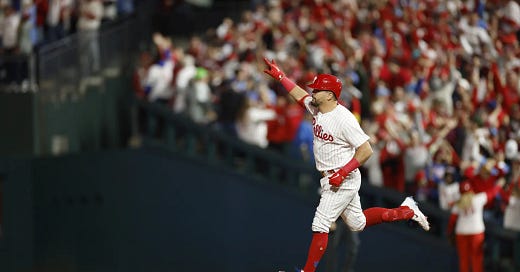The Phillies Are Playing like the Most Dominant Team in Postseason History
No modern team has ever had a better runs-per-game differential in the MLB playoffs. It’s hard to see them being denied another shot at the World Series.
Can the Philadelphia Phillies be beaten this postseason? Like, really be beaten? Yes, we’ve technically seen them lose — in Game 2 of the Division Series — but it took a historic game-ending 8-5-3 double play to make that happen. Otherwise, the Phillies have neither lost nor looked especially at risk to do so, winning each game by multiple runs.
That was true once again in Tuesday’s NLCS Game 2, as the Phillies cruised to a 10-0 win over the Arizona Diamondbacks. Philadelphia leaned on what has become a common formula for them in the playoffs: Numerous home runs from their deep lineup of sluggers, a great start from Aaron Nola, and a little home cooking at The Bank. The rest took care of itself, and the Phillies are now two wins away from the World Series.
As we mentioned after Game 1, this Phillies-Diamondbacks matchup was supposed to be a clash of elite starters — Nola and Zack Wheeler versus Zac Gallen and Merrill Kelly. But Arizona’s chances have unraveled in direct relation with its aces not showing up in top form. After Gallen allowed five runs over five innings in the opener, Kelly was better for most of Game 2, but he was ultimately chased from the mound in the sixth following another Kyle Schwarber HR (his second of the game and third in two nights). Kelly ended up being charged with four runs in 5 ⅔ innings, spotting the Phillies a lead they would later add much more to.
Nola didn’t need the huge run-support figure; he was masterful, striking out seven while allowing just three hits and zero walks in six innings. Wheeler and Nola have combined to yield only two earned runs in 12 innings this series, and seven earned runs in 37 ⅔ innings during the playoffs overall (a microscopic 1.67 ERA). That’s part of a remarkable overall effort for Philadelphia’s entire staff — they collectively have a 1.39 ERA, the second-lowest for any team with at least seven games played in a postseason since the divisional era began in 1969. (The 1983 Baltimore Orioles posted a 1.10 mark.)
It’s nearly impossible to beat a team constructed this way when all the components are working so well. So it’s no coincidence that the Phillies’ wins have piled up as a number of all-time statistical records come into focus. In addition to the pitching performance, Philadelphia’s rate of 2.38 home runs per game is now just 0.05 behind the 2020 New York Yankees for the highest in a single modern postseason. Their six-game home winning streak to start the postseason is tied for the second-longest in history. And Philly’s +4.13 runs-per-game differential in the playoffs is tracking to be the most dominant in our entire sample.
The Phillies aren’t the only team from 2023 on that list; their ALCS counterparts, the Texas Rangers, are actually undefeated (7-0) in the playoffs, though not with quite as imbalanced a run differential. The two teams are now highly probable (around 70%) to meet up in the World Series, according to the probabilities implied by FanDuel’s odds. The best combined record for the two teams heading into the Fall Classic is 16-2, belonging to both the 2014 Giants-Royals matchup and last year’s Phillies-Astros tilt. The Phillies and Rangers could set a new mark if things keep unfolding the way they have this postseason.
That’s getting a bit ahead of ourselves, of course. But after a lopsided victory to go up 2-0 in the NLCS, it’s getting hard to see these dominating Phillies be denied in their return journey to the World Series.
Filed under: Baseball





